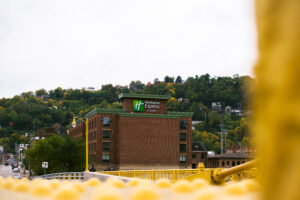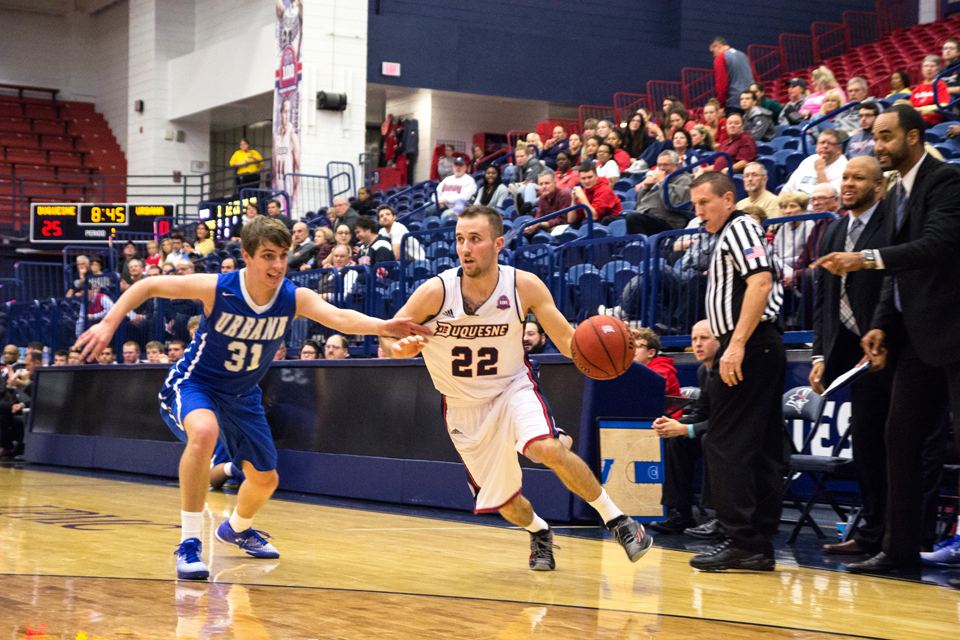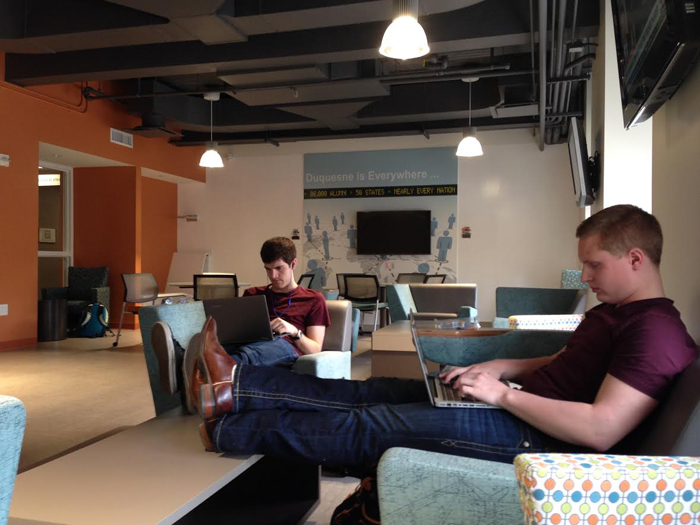
Zoe Stratos | Staff Writer
10/15/2020

As the second wave of COVID-19 begins to sweep the country, more and more concerns are being raised about the potential for an outbreak on Duquesne’s campus.
Part of Duquesne University’s mission to stop the spread of COVID-19 is to place these contact traced students in quarantine, and the university had to look off campus for help.
On Duquesne’s COVID-19 information website, readers can find a daily report of cases by isolation and quarantine status: one of which is “Currently in Quarantine Hotel, today” with a number listed below.
This quarantine hotel, the Holiday Inn Express, can be found right off of the 10th Street Bridge in Pittsburgh’s South Side neighborhood, and started housing contact-traced students back on August 24.
Currently, the hotel is unavailable to the public, as their booking website is closed off for the entire month of October and November; moreover, calls to the hotel to book a reservation only result in a “we’re booked for that weekend.”
Within the hotel’s closed doors are 59 quarantined students (at the time of publication) as well as hotel staff and Duquesne staff. Duquesne staff members declined an interview, saying they “are not disclosing any information as of now.”
However, Duquesne’s Vice President for Marketing and Communications, Gabriel Welsch, explained that the staff working at the hotel is assigned through Residence Life: a Resident Director and Assistant Resident Director. Along with these professionals picked because they “understand the specific needs and conditions of student life,” the hotel’s manager, cleaning staff, and desk staff all still work at the hotel.
Shawn Jones, a junior and offensive lineman for Duquesne’s football team, departed for the hotel on Oct. 3 along with other players who live on campus, after cases began popping up within the team.
“We found out from our coaches,” Jones said. “There were rumors that kids had COVID, and people kept disappearing from lifts. Then we were told to quarantine in our rooms.”
Currently, students who test positive for COVID-19 on campus are required to isolate in distinct rooms on an isolation wing. The fifth floor of Towers is being used for this purpose. At the time of publication, the Towers isolation wing housed 10 students.
But the on-campus quarantine rooms didn’t last long: after Jones was given a rapid test and confirmed negative, he was sent to the Holiday Inn Express by shuttle. Jones was given enough time to pack school supplies, as well as two weeks worth of clothes before taking off.
Students are assigned a room, and cleaning supplies are placed in each room for the students to use. The hotel staff does not clean the student rooms. Students are also able to do laundry in the hotel’s laundry room.
Since students are confirmed negative through the rapid test, they are able to leave rooms and go to the lobby to grab breakfast, lunch and dinner — provided by Parkhurst.
“We also get an hour per day to go outside and maybe go get some food. We have a 10 p.m. curfew, so we’re not allowed to leave after then,” Jones said. “I have other friends here, and we’re allowed to have quick visits; obviously socially distanced and with masks on.”
But with only a rapid test and no official lab results, the accuracy of the tests can easily be called into question.
Despite Jones’s positive outlook on the experience, sophomore RJ Enders felt very differently.
About two weeks ago, Enders’ friend, who asked not to be named, felt sick, left Duquesne’s campus and ended up testing positive while at home the very next day. Shortly after testing positive, she contacted students she had in-person contact with, making them aware of her diagnosis.
“I was actually kind of terrified,” Enders said. “I had been around my grandparents the following day without knowing she had it yet. I was really scared for them because you hear a bunch of horror stories.”
But after talking to one of Duquesne’s contact tracers, Enders felt a bit more comfortable with his incoming rapid test results, but not what was to come after.
“It was kind of a blind experience. I was on the phone that entire day, and it was hard to find answers as to what was going to happen,” Enders said. “I kept talking to Health Services, asking them questions. I mean, we didn’t even know where we were actually going. We didn’t know the difference between isolation in the hotel and isolation in Towers. I didn’t even know what I needed; did I need towels for the shower? Did I need a pillow? It was kind of a guessing game; they weren’t as prepared as I thought.”
After staying in the hotel for 11 days, Enders had to call Health Services and was asked a series of questions regarding his health while in the hotel, including whether or not he was showing symptoms or felt sick during his stay. After questioning, the health professional sent a clearance letter to Residence Life, and to Enders’ health portal.
This past Sunday, Enders packed up his things and headed back to his dorm on Duquesne’s campus.
“I understand where they’re coming from, but then again I felt it was almost pointless the way they handled it,” Enders said. “As for students, make sure to listen to the protocols that are in place right now, because going to the hotel is not a fun experience. You want to hang out with your friends and go to classes, so just listen to the guidelines.”




